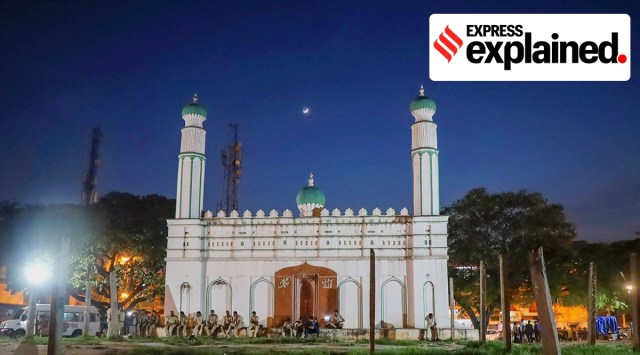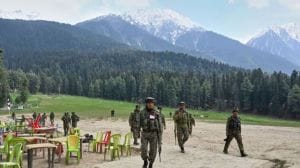Refusing to allow Ganesh Utsav at the Bengaluru Idgah, the Supreme Court on Tuesday directed the Karnataka government to maintain status quo on the issue. After a two-judge Bench delivered a split verdict earlier in the day, Chief Justice of India U U Lalit constituted a fresh three-judge Bench that heard the case again.

At the heart of the issue is the Karnataka government attempt to use 2 acres and 5 guntas of land at Bengaluru’s Chamarajpet Idgah.
In June, the assistant revenue officer issued a show cause notice to the Wakf Board to produce documents to prove its title after news reports surfaced that the Idgah land was a playground, and belongs to Brihat Bengaluru Mahanagara Palike, the city’s municipal corporation.
The Wakf Board moved the Karnataka High Court, and on August 25, a single-judge Bench passed an order restricting the use of the Idgah only to Independence Day and Republic Day celebrations by the government, Ramzan and Bakrid prayers for the Muslim community, and a playground for children on other occasions.
The state government challenged the order before a two-judge Bench the next day. The HC then modified the order to allow “religious and cultural activities” from August 31.
 Heavy security deployed outside Idgah maidan in Chamarajpet, Bengaluru, to avoid any untoward incident ahead of Ganesh Chaturthi celebrations. (Express Photo: Jithendra M)
Heavy security deployed outside Idgah maidan in Chamarajpet, Bengaluru, to avoid any untoward incident ahead of Ganesh Chaturthi celebrations. (Express Photo: Jithendra M)
“The Indian society comprises religious, linguistic, regional or sectional diversities. The Constitution…fosters brotherhood amongst various sections of society. The principle of religious toleration is characteristic of Indian civilisation,” the HC said.
Story continues below this ad
“We, therefore, at this stage, in the peculiar facts of the case, modify the interim order dated 25.08.2022 and permit the state government to consider and pass appropriate orders on applications received by the deputy commissioner seeking use of the land in question for holding religious and cultural activities for a limited period from 31.08.2022 onwards,” the HC said.
With Ganesh Chaturthi falling on August 31, the government allowed the use of the Idgah for the festival.
The Wakf Board then moved the Supreme Court challenging the government’s order.
What is a Wakf property?
Story continues below this ad
The Wakf Act defines Wakf as a permanent dedication by a person professing Islam, of any movable or immovable property for any purpose recognised by Muslim law as pious, religious or charitable.
 Police personnel deployed at Chamarajpet Eidgah Maidan, following Hindu organizations demands to celebrate Ganesha festival at the ground. (Express Photo: Jithendra M)
Police personnel deployed at Chamarajpet Eidgah Maidan, following Hindu organizations demands to celebrate Ganesha festival at the ground. (Express Photo: Jithendra M)
When did the controversy begin?
Back in 1965, the Mysore state government promulgated a notification bearing number NBF 19 (1) 64, entry 137 of which said the Idgah maidan Chamarajpet was formally gazetted as a Wakf property pursuant to a survey conducted by a government survey commissioner.
In 1982, for the first time, communal violence over the maidan took place during the Ganesha festival.
Story continues below this ad
Of late, Karnataka has seen a series of communally polarising incidents, including the hijab controversy in schools and colleges, and the banning of Muslims at temple fairs. With Hindu right-wing groups demanding that the government take over the Idgah land and declare it a public ground, the BJP has been seeking to leverage the controversy to consolidate Hindu votes.
So what has the SC ruled?
The case was initially heard by a two-judge Bench comprising Justices Hemant Gupta and Sudhanshu Dhulia. But they did not agree, and the case had to be heard by a three-judge Bench. Given the urgency, CJI Lalit set up a three-judge Bench headed by Justice Indira Banerjee and also comprising Justices A S Oka and M M Sundresh.
Senior Advocate Mukul Rohatgi who appeared for the state government agreed that the Idgah land has not been used for any other religious purpose except by the Muslims for over 200 years. However, he argued that the state owns the land, and can use it for any purpose it deems fit.Senior Advocate Kapil Sibal, who appeared for the Idgah, argued that the state had not challenged the title of the Idgah when the land was declared a Wakf as per law. He also cited a 1964 judgment of the SC which had confirmed earlier rulings of the Mysore High Court that not all graveyards in the city were owned by the municipality. The ruling also said that the municipality was not in possession of the Idgah on the mere count that children played there.
Story continues below this ad
What happens to the case now?
After the SC ruling, the Ganesh Utsav cannot be celebrated on the Idgah premises this year. But the larger question of the use of the land remains. The single-judge Bench of the Karnataka High Court will continue to hear the case on the title of the Idgah.



 Heavy security deployed outside Idgah maidan in Chamarajpet, Bengaluru, to avoid any untoward incident ahead of Ganesh Chaturthi celebrations. (Express Photo: Jithendra M)
Heavy security deployed outside Idgah maidan in Chamarajpet, Bengaluru, to avoid any untoward incident ahead of Ganesh Chaturthi celebrations. (Express Photo: Jithendra M) Police personnel deployed at Chamarajpet Eidgah Maidan, following Hindu organizations demands to celebrate Ganesha festival at the ground. (Express Photo: Jithendra M)
Police personnel deployed at Chamarajpet Eidgah Maidan, following Hindu organizations demands to celebrate Ganesha festival at the ground. (Express Photo: Jithendra M)




































